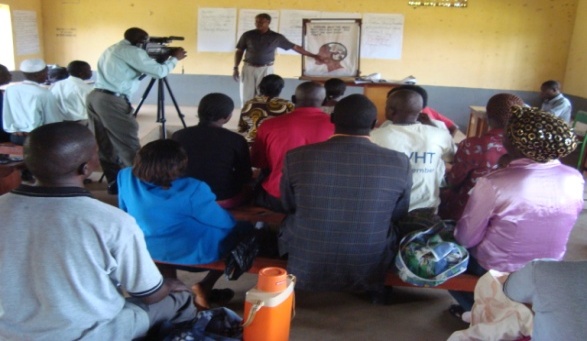What is the Epicentre Methodology?
The Epicentre program is founded in the unyielding belief that the people of Uganda like all the people world over are KEY to their own development.
The program uses the following approach and methods.
Consciousness-raising to deal with mindset change first. Members of the community (women, men, youth, children and people with disabilities) are introduced to the principles of the creative process whose key elements are: vision, corresponding current reality and the resultant structural tension due to the gap between the two. This is what we have called the ‘Visionary Approach’ to sustainable development. They learn how to form a vision for themselves, their families, communities and at the same time recognize accurately their realities they are in. Experience has shown that when one realizes the gap between what one wants and what one has, this generates energy to plan, mobilize resources and make informed choices on how to meet their aspirations. If these principles are internalized and practiced, visionary leadership emerges. This leadership mobilized others to apply the same principles. In this way, the desire for change/development comes organically and energy levels to change the status quo for the better become higher and higher. Besides community members, local leaders will be trained in a similar fashion to develop human right based development plans as a tool for community-driven development.
Extension and training in interrelated disciplines. The participants are introduced in what they intuitively did but are often not conscious about integrated planning. They are used, often by force, to segment development disciplines. In this project will learn systems thinking to address the interconnectedness of health, education, financial self-sufficiency, civic participation and human/gender rights within their lives – in concert with visionary leadership. The entry point is health, especially water and sanitation, and nutrition-based agriculture. Thereafter, linkages for financial intermediation and training in natural resources management, appropriate technologies and gender-related issues including human rights will follow.
Information sharing and dialogues. Members of the communities and leaders will share their views on the community radio (KKCR 91.7 FM)). They will give testimonies how they change their mindsets and apply the newly gained skills to change the quality of life. Dialogues between the different stakeholders are organized to enhance shared visions and shared actions plans and transcendence above tribal, religious, gender and political barriers.
2-generation approach. Adults and children at schooling age (including girls) are supported to develop collaborative structures to ensure sustainable livelihood and health in their homes and communities. For example, they learn together, develop a shared vision, analyze their current situation, apply systems thinking and team learning, plan for actionable steps together and learn functional adult literacy skills to attain their shared goals.

